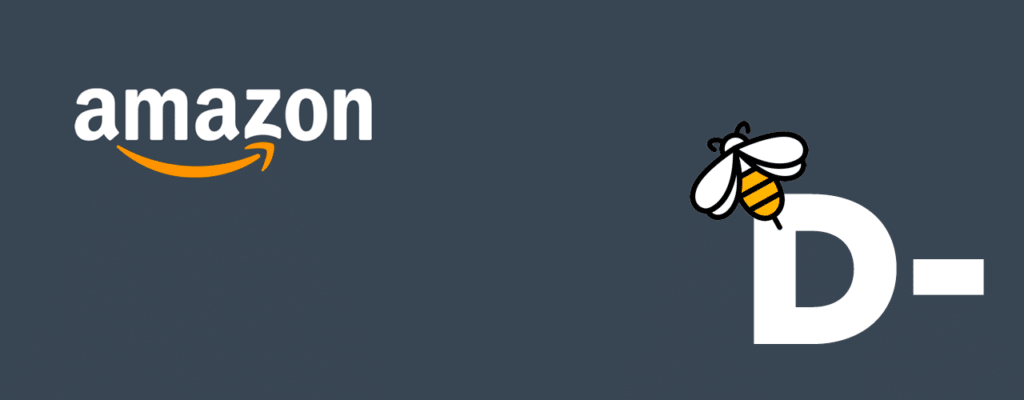
Amazon*
Summary of Amazon grade

Pollinator Health Policy
5 out of 45 points
Amazon acquired Whole Foods Market in 2017, signaling its commitment to expand organic offerings.
Amazon does not have a written, publicly available pollinator health policy for food and beverage supply chains that addresses the need to reduce use of pesticides of concern to pollinator and human health and to expand healthy, bee-friendly organic offerings. A strong policy would include shifting to least-toxic farming approaches in order to avoid regrettable substitution of one toxic pesticide with another. The ecological farming methods that underpin organic farming, integrated pest management and regenerative agriculture reduce farmers’ overall need for pesticides.
Commitment to reduce pesticide use
0 out of 15 points
Avoiding regrettable substitutes
0 out of 5 points
Commitment to least-toxic approaches in non-organic supply chains
0 out of 10 points
Commitment to organic
5 out of 15 points

Implementation
13 out of 90 points
Amazon acquired Whole Foods Market in 2017, significantly expanding the company’s organic offerings. Amazon reported organic sales to Friends of the Earth for Amazon Fresh stores. Amazon’s 2024 sustainability report states that, for Amazon private brands, 70% of cocoa, 98% of coffee, and 75% of tea are Rainforest Alliance, Fairtrade International, or Fair Trade USA certified, which have meaningful criteria on Integrated Pest Management, and in some cases, restrictions on pesticides of concern.
Amazon has not taken any other discernible action to reduce use of pesticides of concern to pollinator and human health or expand organic farming and other least-toxic approaches in its supply chains. The actions we evaluated include: 1) tracking use of pesticides in company supply chains, 2) measurably reducing pesticide use in the past three years and publicly reporting on data, 3) supporting farmers in non-organic supply chains to shift to least-toxic approaches such as integrated pest management and regenerative agriculture, 4) measurably expanding organic offerings in the past three years, 5) demonstrating support for U.S. growers to transition to organic farming, and 6) demonstrating advocacy for public policies aimed at reducing agricultural pesticide use, protecting pollinators and supporting the expansion of organic agriculture in the U.S.
Track pesticide use in supply chain
0 out of 10 points
Measurably reduce pesticide use
0 out of 15 points
Prioritize least-toxic approaches in non-organic supply chains
5 out of 20 points
Prioritize USDA certified organic
8 out of 25 points
Support domestic organic growers
0 out of 15 points
Support public policies
0 out of 5 points

Transparency & Accountability
5 out of 21 points
Amazon has educational content online about the value of organic to pollinators and biodiversity.
Amazon does not have publicly available commitments or policies related to reducing use of pesticides of concern to pollinators and human health in its supply chain or expanding organic offerings and other least-toxic alternatives. Amazon does not appear to include reduction of pesticides of concern to pollinators and human health or expansion of organic offerings in company Key Performance Indicators or other formal sustainability criteria. Amazon does not have educational content online about pesticides or a full definition of the USDA certified organic label (prohibition of synthetic pesticides and fertilizers, GMOs, antibiotics, and growth hormones, and promotion of farming methods that protect soil, water and biodiversity).
Make policies and commitments publicly available
0 out of 6 points
Oversight
0 out of 5 points
Educate consumers
5 out of 10 points

Collaboration
5 out of 10 points
Amazon has communicated with Friends of the Earth in the past year. Amazon has not briefed Friends of the Earth on meaningful action the company has taken on pesticides and pollinator protection in the past three years.

Complimentary Home & Garden Policies
4 out of 9 points
Amazon reports that all potted plants sold in Amazon Fresh stores are grown without neonicotinoids.
Amazon has not made a public commitment to remove neonicotinoid or glyphosate products from store shelves.
Policy for live goods
4 out of 4 points
Policy for on-shelf pesticide products
0 out of 5 points

Bonus Points
0 out of 40 points
*Although Amazon acquired Whole Foods in 2017, we graded these companies separately given that Whole Foods still maintains distinct policies. We graded Amazon in relation to its sales and policies for its Amazon Fresh stores.
32 Points
D-
grade